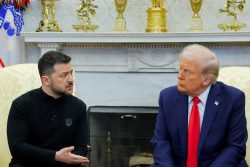Dear Editor,
I appreciate sentiments expressed in Mr E B John’s letter, ‘Kanhai was a great Guyanese – not Indo-Guyanese ‒ cricketer’, (SN, January 7). Mr John was responding to Prof Clem Seecharran’s SN news item, ‘Rohan Kanhai: Indo-Guyanese hero turns 80’ (Dec 25, 2015).
Mr John was correct in stating that when Guyanese like Kanhai and Lloyd played cricket for the country or the WI team, we did not see their ethnicity, we saw them as Guyanese cricketers. Mr John, however, fails to garner that one’s ethnic background is an important frame of reference in many spheres, including sport.
I remember the time when Arthur Ashe was playing for the Wimbledon Cup in the finals in 1975. That was an elated moment for me. For my Black office colleague who hardly had any interest in tennis before, she was literally jumping for joy – because Ashe was Black! Google any major article on Arthur Ashe and one of the first notable statements is the reference to being the “first Black man” or “first African-American” to win a Grand Slam. Ashe did not play tennis as a Black person, but his race was a significant factor in the back of the minds of many.
After reading Prof Seecharran’s article, I feel that the reference to Kanhai’s ethnicity is appropriate and important in the context of the rhetoric. Seecharan rightly observed, “For Indo-Guyanese, the mastery and international recognition of Rohan Kanhai became central to their identity, fortifying their self-esteem even as their political fortunes slumped from the mid-60s. His perceived genius would be refracted through the political, necessarily an ethnic Guyanese prism.”
I shall never forget an incident in 1968. My classmate at Annandale High School, Laquat Ali, proudly brought Kanhai’s book, Blasting For Runs, to our class. He related that he was the first person to borrow that prized book from the Lusignan Community Centre. Laquat (who tragically became a fatal road statistic a year later) was the most popular student in the class because of the book. For us, Rohan Bholalall Kanhai was more than a hero; he was an inspiration, a symbol of hope of ordinary Indian boys in the country. Like my Black office colleague who was ecstatic for Ashe because he was Black, young Indo-Guyanese boys were euphoric not only for what Kanhai did and how he did it, but also for who he was.
Mr John also praised Alvin Kalicharran. Even more than Kanhai, Kalicharran’s achievements were monumental for the Indian people of Guyana. The latter was playing for the West Indies team at a time when Indians in Guyana were blatantly discriminated against by the government, led by the authoritarian, Forbes Burnham.
When Kallicharran was selected to play in the higher league, some Indians could not believe it. The discrimination and injustice they felt (rightly or wrongly) contributed to a psychological malaise that made them think Kallicharran’s inclusion was an anomaly.
It was truly a dark time in the history of our country politically, as well as for the sport that all Guyanese loved. However, Indians sensed so much discrimination that they felt the West Indies team did not represent them – that they were a nonentity in the political, racial and cultural fabric of the country. Therefore, the unbelievable happened: many East Indian fans were publicly clapping and supporting other teams that came to play the WI. It was a difficult era for many, and some would like to hide it and pretend it did not happen. But I surely could have understood their dilemma.
Chanderpaul and Sarwan, though accomplished cricketers, do not have the same aura and significance for Indian Guyanese as Kanhai and Kallicharran did.
It is in vogue to celebrate and highlight ‘African-ness’ but when Indo-Guyanese entities are honoured, they are seen as ‘un-Guyanese’. Indians in Guyana are castigated when they express appreciation for their music, sports and other spheres of accomplishment.
Instead of retreating, Guyanese should be resolved to affirm the varied aspects of the mosaic; instead of castigation, there should be appreciation and celebration with the other!
It is important to recognize and appreciate the ethnic mosaic that is Guyana, and not smother attempts to highlight aspects of this montage.
Yours faithfully,
Devanand Bhagwan









